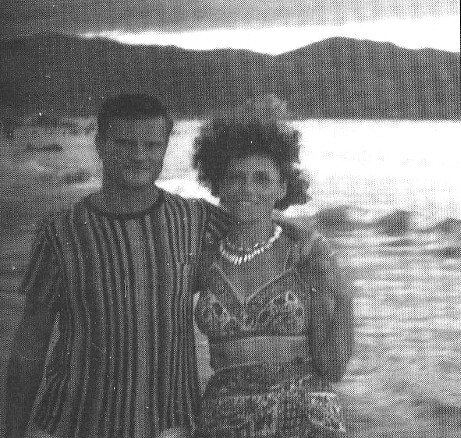Ep. 7: Annette Nancarrow & Louis Stephens: Choosing Love*
There are few forces more powerful in our lives than falling in love. Especially if we’ve been filled with unsatisfied longing for a more exciting life. Sometimes love seems worth risking all security, leaving everything known behind.
Louis Stephens and Annette.
Sometime after Annette’s first trip to Mexico in 1935 with her husband Sidney, she talked her sister Miriam—known as “Mugsie” within the family—into another cruise to Mexico and a chance to spend more time with Louis Stephens. They also sailed on the Ward Line, this time on the SS Siboney, a retrofitted WWI troop ship, stopping in Havana again, then cruising on to disembark in Veracruz. Louis Stephens welcomed them and arranged for them to stay in a small hotel for a week.
The sisters spent one miserable night there attacked by bed bugs. Infuriated—and no doubt embarrassed—Stephens told the manager they were leaving. As he helped the two women gather their things, a man claiming to be the hotel’s proprietor showed up demanding payment for the remainder of the week. The two men argued without resolution and the proprietor left. Shortly, there was another knock at the door and the proprietor asked Louis to step into the hall. When he did, according to how, years later, Charles Stephens related his father's story, the man pulled a gun. Standing behind the owner was another man, who Stephens later theorized was there to serve as a witness that Stephens had been shot in self-defense.
Stephens, a seasoned seaman, strong and muscular, who never backed down from a challenge, forcefully shoved the proprietor backwards and ran outside for a cop. Upon his return with the law in tow, the second man had disappeared and the owner of the hotel was all smiles, claiming a misunderstanding and taking the officer aside for a private consultation. It was quite a scene, but not unusual in those times when most men were armed in the city and physical or political power often determined events.
Presumably, Annette’s time with Louis on this second trip reinforced their strong, physical attraction to one another and their desire to be together on a more permanent basis. Upon her return home, Annette must have made arrangements for receiving mail from him as a series of love notes survives. He called her “Katy,” although we don’t know why, and she called him “Stevie.” His longing apparent, he wrote, “My thoughts [are] in the Rockaway Highlands a-chasing the dear Katie . . . and Katie, I said, you have the softest skin in all the world . . . There’s a great emptiness and mighty hole in me. Ah, Katy Kooty—.”*
Stephens was an expressive correspondent. When he wrote to his old friend Charlie Kaufmann, who had arranged his and Annette’s meeting, his feelings were made even clearer—flowery, but in a more masculine way:
Ah sure . . . and I’m in love, and it’s a strange feeling. I who haven’t really loved a woman these many years . . . rare and unbelievable things happened between us . . . To come 12—yes 12—and more times in a day and then repeat the performance the next day—por eso nunca me sucedio en mi larga vida de joder [never have I experienced this in my wide experience of screwing]. That our bodies should be so good together is marvelous, but our guts too, singing so many of the same flames, makes the whole thing take on the face of a miracle.
It’s not at all surprising that Annette soon became caught up in the idea of going to live in Mexico. Falling in love with Stephens certainly influenced her decision; it was the tipping point in a life already drawing her toward a different path. Although she was ready to make a dramatic change, it was not so easy to get a divorce from Sidney, a city attorney with friends in high places. As she describes it years later, “I really suffered and crucified myself in a sense.” She then leans forward and cocks her head to the side with a winsome look and says, “But it was worth it!”
*NOTE: Some of the information in this chapter and others is drawn from a self-published book, Louis E. Stephens: His Life in Letters, written by his son Charles J. Stephens (now deceased). Charles was a great believer in this project and we had several conversations before he died about his parent's lives and particularly his mother's. He was a kind, warm, and generous man, and he gave me full permission to use anything from his book and our conversations that would be helpful.


